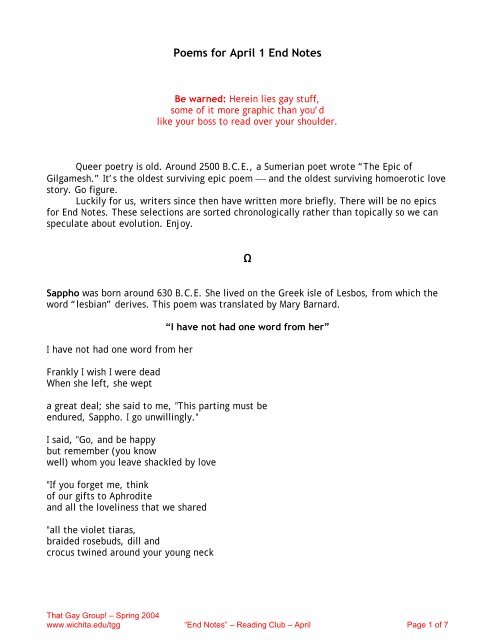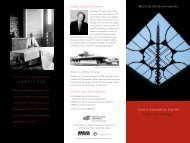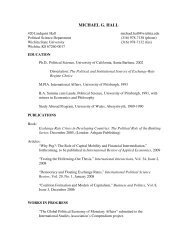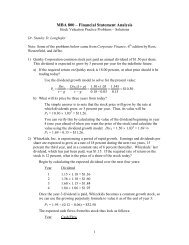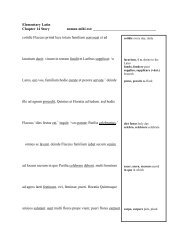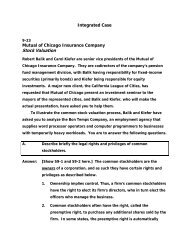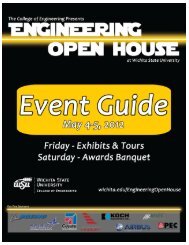Create successful ePaper yourself
Turn your PDF publications into a flip-book with our unique Google optimized e-Paper software.
<strong>Poems</strong> <strong>for</strong> <strong>April</strong> 1 <strong>End</strong> <strong>Notes</strong><br />
Be warned: Herein lies gay stuff,<br />
some of it more graphic than you’d<br />
like your boss to read over your shoulder.<br />
Queer poetry is old. Around 2500 B.C.E., a Sumerian poet wrote “The Epic of<br />
Gilgamesh.” It’s the oldest surviving epic poem ⎯ and the oldest surviving homoerotic love<br />
story. Go figure.<br />
Luckily <strong>for</strong> us, writers since then have written more briefly. There will be no epics<br />
<strong>for</strong> <strong>End</strong> <strong>Notes</strong>. These selections are sorted chronologically rather than topically so we can<br />
speculate about evolution. Enjoy.<br />
Sappho was born around 630 B.C.E. She lived on the Greek isle of Lesbos, from which the<br />
word “lesbian” derives. This poem was translated by Mary Barnard.<br />
I have not had one word from her<br />
Frankly I wish I were dead<br />
When she left, she wept<br />
Ω<br />
“I have not had one word from her”<br />
a great deal; she said to me, "This parting must be<br />
endured, Sappho. I go unwillingly."<br />
I said, "Go, and be happy<br />
but remember (you know<br />
well) whom you leave shackled by love<br />
"If you <strong>for</strong>get me, think<br />
of our gifts to Aphrodite<br />
and all the loveliness that we shared<br />
"all the violet tiaras,<br />
braided rosebuds, dill and<br />
crocus twined around your young neck<br />
That Gay Group! – Spring 2004<br />
www.wichita.edu/tgg “<strong>End</strong> <strong>Notes</strong>” – Reading Club – <strong>April</strong> Page 1 of 7
"myrrh poured on your head<br />
and on soft mats girls with<br />
all that they most wished <strong>for</strong> beside them<br />
"while no voices chanted<br />
choruses without ours,<br />
no woodlot bloomed in spring without song...”<br />
Gaius Valerius Catullus lived from 84 to 54 B.C.E. His dad was friends with Julius Caesar.<br />
Catullus is most known <strong>for</strong> his poems of love and hate about a married woman he had an<br />
affair with, but four of his love poems are directed to a young man. This one is the only<br />
one that isn’t bitter, angry or jealous. If you’re interested, read them all (24, 48, 81 and<br />
99) here: http://catullus.iscool.net.<br />
Ω<br />
48<br />
Juventius, if I could play at kissing<br />
your honeyed eyes as often as I wished to,<br />
300,000 games would not exhaust me;<br />
never could I be satisfied or sated,<br />
although the total of our osculations<br />
were greater than the ears of grain at harvest.<br />
Ω<br />
Walt Whitman would scoff at people who praised him, but that hasn’t kept generations of<br />
readers from doing so. He lived from 1819 to 1892, mostly in New York. One biographer<br />
called Whitman a “God-intoxicated poet”; his poems are inseparably spiritual and sensual.<br />
Most surveys of American literature cover Whitman, but they use chaste poems about the<br />
death of Abraham Lincoln: “O Captain! My Captain!” and “When Lilacs Last in the Dooryard<br />
Bloom’d.” Whitman is generally believed to have been bisexual or gay.<br />
Excerpt from “I Sing the Body Electric”<br />
I sing the body electric,<br />
The armies of those I love engirth me and I engirth them,<br />
They will not let me off till I go with them, respond to them,<br />
And discorrupt them, and charge them full with the charge of the soul.<br />
1<br />
That Gay Group! – Spring 2004<br />
www.wichita.edu/tgg “<strong>End</strong> <strong>Notes</strong>” – Reading Club – <strong>April</strong> Page 2 of 7
Was it doubted that those who corrupt their own bodies conceal themselves?<br />
And if those who defile the living are as bad as they who defile the dead?<br />
And if the body does not do fully as much as the soul? And if the body<br />
were not the soul, what is the soul?<br />
The love of the body of man or woman balks account, the body itself balks account,<br />
That of the male is perfect, and that of the female is perfect.<br />
The expression of the face balks account,<br />
But the expression of a well-made man appears not only in his face,<br />
It is in his limbs and joints also, it is curiously in the joints of his hips and wrists,<br />
It is in his walk, the carriage of his neck, the flex of his waist and knees, dress does not<br />
hide him,<br />
The strong sweet quality he has strikes through the cotton and broadcloth,<br />
To see him pass conveys as much as the best poem, perhaps more,<br />
You linger to see his back, and the back of his neck and shoulder-side.<br />
The sprawl and fulness of babes, the bosoms and heads of women, the folds of their dress,<br />
their style as we pass in the street, the contour of their shape downwards,<br />
The swimmer naked in the swimming-bath, seen as he swims through the transparent<br />
green-shine, or lies with his face up and rolls silently to and from the heave of the water,<br />
The bending <strong>for</strong>ward and backward of rowers in row-boats, the horse-man in his saddle,<br />
Girls, mothers, house-keepers, in all their per<strong>for</strong>mances,<br />
The group of laborers seated at noon-time with their open dinner-kettles, and their wives<br />
waiting,<br />
The female soothing a child, the farmer's daughter in the garden or cow-yard,<br />
The young fellow hosing corn, the sleigh-driver driving his six horses through the crowd,<br />
The wrestle of wrestlers, two apprentice-boys, quite grown, lusty, good-natured, nativeborn,<br />
out on the vacant lot at sundown after work,<br />
The coats and caps thrown down, the embrace of love and resistance,<br />
The upper-hold and under-hold, the hair rumpled over and blinding the eyes;<br />
The march of firemen in their own costumes, the play of masculine muscle through cleansetting<br />
trowsers and waist-straps,<br />
The slow return from the fire, the pause when the bell strikes suddenly again, and the<br />
listening on the alert,<br />
The natural, perfect, varied attitudes, the bent head, the curv'd neck and the counting;<br />
Such-like I love—I loosen myself, pass freely, am at the mother's breast with the little<br />
child,<br />
Swim with the swimmers, wrestle with wrestlers, march in line with the firemen, and<br />
pause, listen, count.<br />
2<br />
That Gay Group! – Spring 2004<br />
www.wichita.edu/tgg “<strong>End</strong> <strong>Notes</strong>” – Reading Club – <strong>April</strong> Page 3 of 7
“Whoever You are, Holding Me now in Hand,”<br />
from the 1900 edition of “Leaves of Grass”<br />
Whoever you are, holding me now in hand,<br />
Without one thing, all will be useless,<br />
I give you fair warning, be<strong>for</strong>e you attempt me further,<br />
I am not what you supposed, but far different.<br />
Who is he that would become my follower?<br />
Who would sign himself a candidate <strong>for</strong> my affections?<br />
The way is suspicious—the result uncertain, perhaps destructive;<br />
You would have to give up all else—I alone would expect to be your God, sole and<br />
exclusive,<br />
Your novitiate would even then be long and exhausting,<br />
The whole past theory of your life, and all con<strong>for</strong>mity to the lives around you, would have<br />
to be abandon’d;<br />
There<strong>for</strong>e release me now, be<strong>for</strong>e troubling yourself any further—Let go your hand from my<br />
shoulders,<br />
Put me down, and depart on your way.<br />
Or else, by stealth, in some wood, <strong>for</strong> trial,<br />
Or back of a rock, in the open air,<br />
(For in any roof’d room of a house I emerge not—nor in company,<br />
And in libraries I lie as one dumb, a gawk, or unborn, or dead,)<br />
But just possibly with you on a high hill—first watching lest any person, <strong>for</strong> miles around,<br />
approach unawares,<br />
Or possibly with you sailing at sea, or on the beach of the sea, or some quiet island,<br />
Here to put your lips upon mine I permit you,<br />
With the comrade’s long-dwelling kiss, or the new husband’s kiss,<br />
For I am the new husband, and I am the comrade.<br />
Or, if you will, thrusting me beneath your clothing,<br />
Where I may feel the throbs of your heart, or rest upon your hip,<br />
Carry me when you go <strong>for</strong>th over land or sea;<br />
For thus, merely touching you, is enough—is best,<br />
And thus, touching you, would I silently sleep and be carried eternally.<br />
But these leaves conning, you con at peril,<br />
For these leaves, and me, you will not understand,<br />
They will elude you at first, and still more afterward—I will certainly elude you,<br />
Even while you should think you had unquestionably caught me, behold!<br />
Already you see I have escaped from you.<br />
That Gay Group! – Spring 2004<br />
www.wichita.edu/tgg “<strong>End</strong> <strong>Notes</strong>” – Reading Club – <strong>April</strong> Page 4 of 7
For it is not <strong>for</strong> what I have put into it that I have written this book,<br />
Nor is it by reading it you will acquire it,<br />
Nor do those know me best who admire me, and vauntingly praise me,<br />
Nor will the candidates <strong>for</strong> my love, (unless at most a very few,) prove victorious,<br />
Nor will my poems do good only—they will do just as much evil, perhaps more;<br />
For all is useless without that which you may guess at many times and not hit—that which I<br />
hinted at;<br />
There<strong>for</strong>e release me, and depart on your way.<br />
Emily Dickinson was mysterious even to her neighbors, and little has been revealed about<br />
her since her death. Some of her poems have a tinge of same-sex lovin’, and we can read<br />
into that what we will. She was born in Amherst, Mass., in 1830 and died there in 1886.<br />
Her breast is fit <strong>for</strong> pearls,<br />
But I was not a 'Diver' -<br />
Her brow is fit <strong>for</strong> thrones<br />
But I have not a crest.<br />
Her heart is fit <strong>for</strong> home-<br />
I - a Sparrow - build there<br />
Sweet of twigs and twine<br />
My perennial nest.<br />
Now I knew I lost her -<br />
Not that she was gone-<br />
But Remoteness traveled<br />
On her Face and Tongue.<br />
Alien, though adjoining<br />
As a Foreign Race<br />
Traversed she though pausing<br />
Latitudeless Place<br />
Elements Unaltered<br />
Universe the same<br />
But Love's transmigration<br />
Somehow this had come<br />
Ω<br />
1<br />
7<br />
That Gay Group! – Spring 2004<br />
www.wichita.edu/tgg “<strong>End</strong> <strong>Notes</strong>” – Reading Club – <strong>April</strong> Page 5 of 7
Hence<strong>for</strong>th to remember<br />
Nature took the Day<br />
I had paid so much <strong>for</strong>-<br />
His is Penury<br />
Not who toils <strong>for</strong> Freedom<br />
Or <strong>for</strong> Family<br />
But the Restitution<br />
Of Idolatry.<br />
To see her is a Picture<br />
To hear her is a Tune<br />
To know her an Intemperance<br />
As innocent as June<br />
To know her not - Affliction -<br />
To own her <strong>for</strong> a Friend<br />
A warmth as near as if the Sun<br />
Were shining in your Hand.<br />
Pierre Louys’ book “Chansons de Bilitis” was at first shunned <strong>for</strong> its lesbian content.<br />
Unsurprisingly, though, lesbians embraced it. That’s how it came to be that some of the<br />
most-famous lesbian poems were written by a man. Louys lived from 1870 to 1925. This is<br />
an anonymous translation.<br />
9<br />
Ω<br />
Penumbra<br />
Under the sheet of transparent wool we<br />
slipped, she and I. Even our heads were sunk<br />
under, and the lamp illumined the stuff over<br />
us. Thus I beheld her dear body in a mysterious<br />
light. We were closer one to another, more<br />
free, more intimate, more naked. 'In the same<br />
shirt,' she said. We remained with our hair up<br />
in order to be less covered, and the perfumes<br />
of the two women rose from their two natural<br />
censers in the bed's narrow space. Nothing in<br />
the world, not even the lamp, saw us that night.<br />
Which of us was lover only she and I could tell.<br />
But men shall know nothing thereof.<br />
That Gay Group! – Spring 2004<br />
www.wichita.edu/tgg “<strong>End</strong> <strong>Notes</strong>” – Reading Club – <strong>April</strong> Page 6 of 7
Amy Lowell was nearly <strong>for</strong>gotten, but modern readers mining <strong>for</strong> gender and sexuality in<br />
poetry rediscovered her. Her book, “What's O'Clock,” earned a Pulitzer Prize in 1926. She<br />
lived from 1874 to 1925.<br />
Ω<br />
“Decade”<br />
When you came, you were like red wine and honey,<br />
And the taste of you burnt my mouth with its sweetness.<br />
Now you are like morning bread,<br />
Smooth and pleasant.<br />
I hardly taste you at all <strong>for</strong> I know your savour,<br />
But I am completely nourished.<br />
Ω<br />
Edna St. Vincent Millay was among the earliest outspoken American bisexuals. She was<br />
born in Maine in 1892 and died in 1950. The book from which this poem is taken earned her<br />
instant fame, and in 1923 she won the Pulitzer Prize <strong>for</strong> poetry <strong>for</strong> another collection.<br />
She is neither pink nor pale,<br />
And she never will be all mine;<br />
She learned her hands in a fairy-tale,<br />
And her mouth on a valentine.<br />
She has more hair than she needs;<br />
In the sun ’tis a woe to me!<br />
And her voice is a string of coloured beads,<br />
Or steps leading into the sea.<br />
She loves me all that she can,<br />
And her ways to my ways resign;<br />
But she was not made <strong>for</strong> any man,<br />
And she never will be all mine<br />
“Witch-Wife,” from “Renascence”<br />
Ω<br />
That Gay Group! – Spring 2004<br />
www.wichita.edu/tgg “<strong>End</strong> <strong>Notes</strong>” – Reading Club – <strong>April</strong> Page 7 of 7


